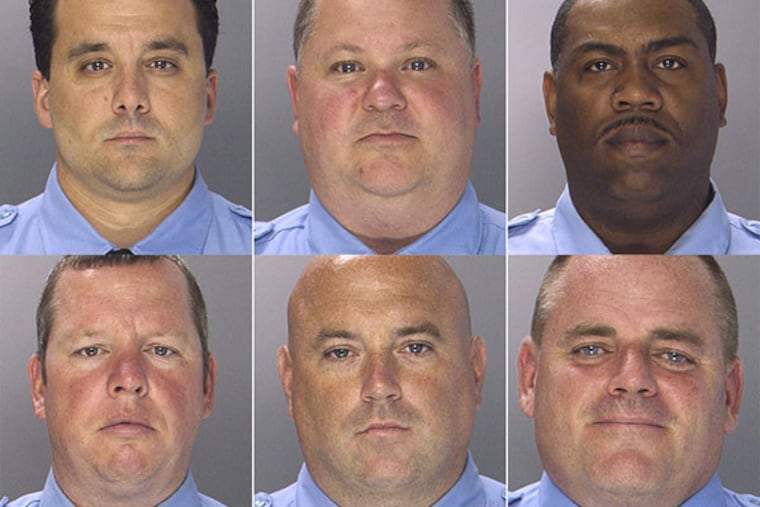More stunning testimony in trial of accused rogue Philly narcotics cops
With a burly police officer on each of his handcuffed arms and a 19-story drop below him from his penthouse apartment balcony, drug dealer Michael Cascioli was asked a troubling question.

With a burly police officer on each of his handcuffed arms and a 19-story drop below him from his penthouse apartment balcony, drug dealer Michael Cascioli was asked a troubling question.
"You've seen the movie Training Day?" Cascioli recalled Police Officer Thomas Liciardello asking, referencing the 2001 film featuring Denzel Washington as a dirty cop. "This is Training Day for . . . real."
What followed, as Cascioli told a federal jury Wednesday, is one of the most disturbing instances in a case filled with allegations of outrageous behavior by a rogue police narcotics unit.
Prosecutors allege Liciardello, the group's leader, ordered the two others - Philadelphia Police Officers Linwood Norman and Jeffrey Walker - to hold Cascioli out over the railing and threaten to drop him to the asphalt parking lot below. The threat was made, Cascioli testified in U.S. District Court, to scare him into giving up the password to his PalmPilot discovered during a raid on his apartment.
"I had two big guys on me on both sides. My feet were off the ground," Cascioli said. "I was thinking they're just going to drop me right there."
Liciardello, Cascioli recalled, said: "Hey, we'll just throw you off, and no one will ever know."
Cascioli, a rail-thin 38-year-old with skeletal features and sunken eyes, testified on the third day of the racketeering conspiracy trial of Liciardello, Norman, and four other members of their unit - Brian Reynolds, Michael Spicer, Perry Betts, and John Speiser.
Prosecutors allege the group shook down drug suspects for years with ganglike tactics that netted them more than $400,000 in cash, drugs, and personal property - seizures they downplayed on police reports to cover up their takes.
Walker, one of the officers Cascioli accused of deploying the balcony threat, has already pleaded guilty in a separate corruption case and is set to testify against his former colleagues.
Jurors on Wednesday also heard from Dontay Murphy, a 29-year-old SEPTA bus driver, who alleged Liciardello pistol-whipped him during a 2006 drug arrest and later lied about it on a police report. The police report Liciardello later filed said Murphy sustained his injuries after knocking his head against a cinder-block wall.
But it was Cascioli's story that drew harshest scrutiny from defense lawyers. They have painted their clients' accusers as opportunistic liars, eager to blame the police for their own criminal behavior and cash in with lucrative police-brutality lawsuits.
On the stand, Cascioli described himself as one of the city's largest wholesale marijuana dealer, who trafficked with only a handful of upscale clients. He grossed from $360,000 to $600,0000 a year, he said.
Under questioning from prosecutor Anthony Wzorek, he recounted the events that brought Liciardello and the others in November 2007 to his 19th-floor penthouse at City Avenue's Executive House apartment tower.
His neighbor had begun cooperating with the officers 10 days before and offered to buy marijuana and mushrooms from Cascioli so Liciardello could catch him in the act.
When Cascioli left his apartment to deliver the drugs, Liciardello and a half dozen other officers dressed in ski hats and dark clothing were waiting.
"My first immediate thought was it was the Mafia and I was getting robbed," Cascioli said.
The group tackled him to the ground and led him back inside. They tore apart his apartment looking for money and more drugs. Soon, they had pressured Cascioli to draw his supplier - Bronx-based dealer Jeremy Sarkissina - into their dragnet.
The department's top brass would later tout the Cascioli operation at a news conference as a major success that resulted in the seizure of 16 pounds of marijuana, 12 pounds of mushrooms, and nearly $440,000 in cash.
But although several department supervisors stopped by the search of his apartment during the search, it was what happened while they weren't present that prosecutors now say was criminal.
Cascioli said he was never read his Miranda rights or shown a search warrant. He alleged Walker and Betts hit him several times throughout the night, while others took money from his nightstand to order pizza.
And when, days later, Cascioli retrieved his belongings from the ransacked apartment, he noticed more than just drugs had gone missing. A Versace sweat suit, two Movado watches, an iPod, and a GPS - together worth about $8,000 - had all disappeared, he said. None of it was listed on the receipt of seized property he was given by the police.
"The first thing I said was I want an attorney," Cascioli said.
Liciardello's foul response, he recalled, was: "F- you."
Throughout his testimony Wednesday, Cascioli described the encounter in an assured voice and held his ground under heavy questioning from the defense.
Still, lawyers for the six indicted officers caught a few inconsistencies in his story - whether or not the officers wore ski masks when they tackled him outside his apartment, whether or not he was wearing handcuffs while being held over the balcony, and whether he had initially lied to the FBI about his brother, who was hiding drug money for him in Maryland.
But when challenged by defense lawyer Jack McMahon on his recent decision to consult a lawyer to potentially sue the officers, Cascioli stood his ground.
"I want what's right to be right," he said. "My rights were violated. I want to win."
215-854-2608 @jeremyrroebuck